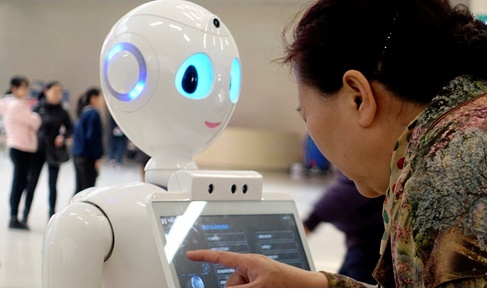China counts on AI to find a cure for its ailing health care system

Credit: NASA
Julielynn Wong, January 12, 2017
Astronauts can’t take everything they need with them on a long space mission. Now they can use Star Trek Replicators to make personalized medical supplies on demand in space!
On Jan. 11, 2017, the first medical supplies were 3D printed off Earth. Hand injuries are common medical problems for astronauts. But it wasn’t possible to make custom-fitted splints for astronauts during a space mission until now.
3D4MD has shown that you can 3D print a custom mallet finger splint for an astronaut by using (1) a laser hand scan saved from the fitting process for spacesuit gloves, (2) free software, and (3) a solar-powered 3D printer.
The 3D4MD team designed one splint with a star pattern to highlight that it was made amongst the stars. Both splint models were designed to be worn without a velcro strap in case this item is not readily available during a space mission or on Earth.
 Mallet finger injuries are common hand injuries on Earth. Improperly treated mallet finger injuries can lead to permanent crippling hand deformities. Research indicates that the best way to treat mallet finger injuries is to use custom-fitted, handmade splints. Sadly, there is a global shortage of skilled healthcare workers who can make these custom-fitted splints, especially in rural communities.
Mallet finger injuries are common hand injuries on Earth. Improperly treated mallet finger injuries can lead to permanent crippling hand deformities. Research indicates that the best way to treat mallet finger injuries is to use custom-fitted, handmade splints. Sadly, there is a global shortage of skilled healthcare workers who can make these custom-fitted splints, especially in rural communities.
Our global community of Medical Makers is developing a way to use cellphones to scan patients and 3D print custom mallet splints on-site using recycled plastic and solar-powered 3D printers. This could save time and money and improve health outcomes for the 45% of the world’s population who live in rural areas and who lack access to healthcare.
Canada, which celebrates its 150th anniversary of Confederation this year, has a long-standing record of achievement in aerospace medicine and universal healthcare. 3D4MD’s innovative project shows how advancing space medicine can also enhance healthcare here on Earth, at home and abroad. No government grants — meaning no Canadian taxpayer dollars — were used to support this groundbreaking project. This project was 100% funded by revenue from keynote speeches, workshops, and 3D printing consulting services provided by 3D4MD.
3D4MD thanks our incredible team members; Scott Summit, Teddy Shropshire, Marius Kintel, Jerry Ennett, Erik Lloyd, Chevis Dilbert, Mohammed Zoubi, Anush Agarwal, Mitchell Acton plus Made In Space’s Andrew Rush, Aaron Kemmer, Jason Dunn, Hasti Afsarifard, Brad Kohlenberg, Matthew Napoli, and Dylan Tepper, for their amazing contributions and support of this project.
